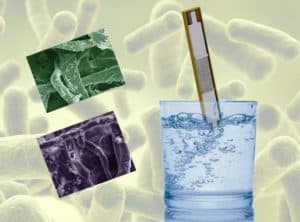A new discovery has led a group of scientists at Toronto’s York University to believe they have found a quick, inexpensive way of removing dangerous E. coli bacteria from drinking water.
They believe their discovery could have a profound impact on public health across the globe, according to a study published in the journal Environmental Science: Water Research & Technology.

More than a quarter million cases of just one type of E. coli infection occur in the United States every year, according to the Centers for Disease Control and Prevention. While E. coli is familiar to humans – healthy forms are commonly found in the human gut – some strains can cause severe disease, including abdominal cramps, diarrhea, fever and vomiting.
“E. coli infection is usually transmitted through consumption of contaminated water or food,” explains the World Health Organization.
But a new approach to eliminating E. coli from drinking water shows a tremendous success rate, according to Sushanta Mitra, a researcher at York University’s Lassonde School of Engineering and lead author of the study.
Mitra and his colleagues developed a method called DipTreat, which uses sugar-laced strips of paper to literally kill E. coli in drinking water.
“With DipTreat, we have learned it will take less than two hours to fish, trap and kill E. coli in water,” said Mitra in a news release. “We were able to efficiently remove almost 90 percent of bacteria by dipping the special paper strip, DipTreat, in contaminated water samples.”
The DipTreat method uses porous paper strips to trap the dangerous bacterial cells and an “antimicrobial agent” derived from the seeds of the moringa tree, which also known as a drumstick or horseradish tree, according to the York University release.
To attract the E. coli cells to the paper strips, scientists added a naturally occurring sugar – a form of glucose – to “facilitate the ‘fishing’ of E. coli cells by inducing their chemotactic response,” states the study.
“We expect this new approach to ‘fish’, ‘trap’ and ‘kill’ E.coli will seamlessly eliminate the harmful bacteria from water,” said Mitra.
According to the study results, when the porous sugar-laced strips were left in contaminated water for a 90-minute duration they removed a maximum of 99.5 percent of the harmful bacteria.
“Based on the results of the study, we anticipate that this approach can lead to the development of a new generation of inexpensive and portable water treatment devices which can passively remove and neutralize deleterious bacteria from water,” suggests the study.
Through previous studies, the York University researchers discovered a way to detect harmful E. coli in drinking water within two to three minutes. The Mobile Water Kit features a vast improvement over previous methods that would take between one to two days to detect the bacteria.
The researchers say that the current DipTreat system is effective for small quantities of water – for example, a hiker could collect a cup of water and use the sugar-laced strips to purify it before drinking.
The team hopes to expand on their model to achieve a wider impact on a population-based level.
Richard Scott is a health care reporter focusing on health policy and public health. Richard keeps tabs on national health trends from his Philadelphia location and is an active member of the Association of Health Care Journalists.


![How To: ‘Fix’ Crepey Skin [Watch]](https://cdn.vitalupdates.com/wp-content/uploads/2017/05/bhmdad.png)












